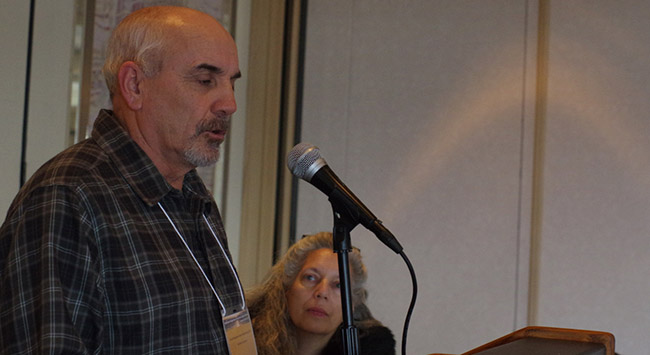Calls for new approaches at Robinson Superior Access to Justice Forum

By Rick Garrick
Fort William Chief Peter Collins called for a new approaches to justice at the Robinson Superior Access to Justice Forum, held March 29-30 in Thunder Bay.
“The minister visited (the Thunder Bay jail) and he said we don’t need a new jail and that is my position too — we don’t need a new jail, we need a new way of thinking,” Collins says during the First Nations Family Court presentation on March 30. “We have to have a healing process, an education process. And mentor them to get back on the streets so when they do get out of those incarceration situations that they can be a meaningful part of our society, so they have that training, they have that ability to go to work and start providing for their family.”
Collins says many of the Aboriginal people in federal institutions did not commit violent crimes.
“Some of them are there because they got addicted to drugs and started to rob different places,” Collins says. “But when they go into the system they don’t get any adequate training or adequate healing processes.”
Frances Wesley, the urban judicial partnership capacity builder/trainer with the Thunder Bay Indian Friendship Centre who delivered the First Nations Family Court presentation, agreed with Collins.
“I think that was an important comment that he made in regards to looking after our own children,” Wesley says. “We don’t want our kids to go to jail. We need to guide our people, but unfortunately there are many of them in the court system right now.”
Wesley has been involved with the development of a First Nations or Aboriginal Peoples’ Court in Thunder Bay. Ontario’s first Aboriginal People’s Court, now named the Indigenous Persons Court, opened in Brantford in 2014.
“I’m hoping the working group, as we develop the (Aboriginal Peoples’ Court) model, would include Elders to participate in that courtroom and families to show our support for the individuals who are going through the system,” Wesley says. “Currently, in the mainstream, you don’t have that. It’s non-existent, but if we develop this process, then we will see the changes happening.”
In addition to the First Nations Family Court presentation, the Robinson Superior Access to Justice Forum featured presentations on Residential School Legacy, 1850 Robinson Superior Treaty, Ontario Native Women’s Association Programming and Justice, Women’s Family Court Support Program and Feathers of Hope Justice and Juries report. Panels on Justice and Leadership and focus group sessions on Child Welfare, Youth Experience with Criminal, Family Law and Legal Information and Access were also featured during the forum.
Regional Grand Chief Pierre Pelletier says the forum gave the Robinson Superior communities an opportunity to access information about the justice system.
“The biggest issue is access to the services,” Pelletier says. “We need to have somebody in the Robinson Superior Treaty area that we can access (who knows) how it works, (to educate) our youth on how it works, how to get pardon and how to get proper representation if something does happen.”
Fort William Councillor Michelle Solomon says First Nations youth are over-represented in the justice system.
“There needs to be measures put in place that look at substance abuse issues, mental health issues and things like that to start moving us forward,” Solomon says. “I’ve had some personal experience with the justice system, not my own, but I am certainly aware of the difficulties people can have in navigating that system.”


